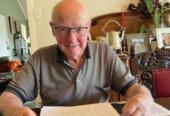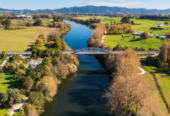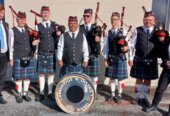
Jack poised and ready to run.
His wife describes him as a cat with nine lives.
“And she says I’ve used all of them up,” he said.
A stroppy horse flipped over backwards while he was riding it. He watched the ground screaming up at him from an aeroplane cockpit and escaped the vertical dive with just 50m to spare. An irate cow attacked him and damaged one of his kidneys. He beat bowel cancer. And he nearly drowned in the sea at Mercury Bay.
He has had more shaves with death than he can count on one hand.
“He’s a risk taker,” his wife Margaret said. “He loves the challenge of a risk. It’s much more exciting than walking a straight line.”
But balancing out his thrill-seeking side are the quieter aspects of his personality, highlighted by his two great passions: gardening and working stock with sheepdogs.
Michael Oliver is a dog triallist and a daredevil.

Michael congratulates Jack on a job well done.
The 79-year-old, who grew up on a hilly 404-hectare sheep and beef farm in Whitehall and has lived there most of his life, has been competing in sheepdog trials for 60 years.
It’s the connection between man (or woman) and dog he loves most about the sport.
“When dogs’ natural instincts are brought under useful control I love the way they can manage the movement of livestock,” he said.
“When they know what they’re doing they can be extremely helpful like that, and that is a great joy to me, when you can work as a team with your dog and not as an authoritarian boss.”
An agricultural institution that gained national exposure through the New Zealand television programme “A Dog’s Show” (1977–1992), sheep dog trialling involves guiding small mobs of sheep through a series of paddock obstacles and into a pen. Competitors can use only a dog and whistle to achieve the task and must not touch the sheep.
Michael bought his first sheepdog when he left school in 1960 and headed to the Wairarapa 18 months later to take a shepherding job.
After watching one of the local sheepdog trials he looked up one of the winners in the phone book, got himself invited to dinner and gleaned some great tips.
“So that got me off to a fairly good start,” he said.

Michael Oliver and his wife Margaret on their Whitehall Farm.
Ever since then he’s been wringing every bit of advice and information he can from top competitors.
“I’ve always done that, I’ve got advice from the very best people and watched to see how they’re so good,” he said. “I still do. You’re never too old that you can’t learn something else.”
After 60 years in the sport, the best guidance he can give is: “try and get inside a dog’s head and work with it”.
“If it bashes in far too close to the sheep and upsets them, call it back and growl and grumble at it and then send it again, several times if necessary. When it does bring the sheep back properly praise it. The great desire of the dog is to bring the sheep down.”
Trainers fire guns, crack whips and all sorts to make a dog run wider.
“But instead of fighting with it, why not show the dog what you really want and then make a fuss of it when it gets it right? And if a dog’s trying to help you, then you can help it with little guiding whistles.”
Michael achieved one of his most memorable wins with a dog named Clancy.
“I represented New Zealand against Australia at the very first inter-dominion test at the Auckland Easter Show in 1974 with Clancy the day after my daughter Kate was born,” Michael said.
“He was a cool dog, we won a lot you know; it was good. And we won against Australia too. So I’ve kept that line ever since.”
His current heading dog, Jack, is a descendant of Clancy.
Personally, over the years, Michael has learnt another important lesson.
“The biggest thing I think I’ve probably learnt – because it’s my own nature – is to try not to show off,” he said.
His ego let him down more than once during his youth, he readily admits.
Like the time he couldn’t resist showboating with his huntaway at a North Island championship near Pukeatua as he wrapped up a near perfect run.
Putting “a special little finish on the very end of the hunt”, he allowed his dog to take centre stage and give a couple of heavy barks, causing one of the sheep to trip and sprawl over backwards.
There was no championship title that day.

Whitehall sheep and beef farmer Michael Oliver has been competing in sheepdog trials for 60 years and hosted them on his property for 24 years until holding the last one in June.
“Any older and more experienced man would have known the run was going to win and they would have allowed a little bit of caution just to nail it,” he said.
“One ear cocked to hear the comments from behind, that’s not how you win a dog trial.”
Michael, who got his private pilot’s licence at 17, also had a tendency to show off in aeroplanes.
Once, in the Wairarapa, he was taking another shepherd for a scenic flight over the farm they worked on when he spotted a tractor ploughing a paddock.
“So we just flew along just along the ploughed ground and shot up the front spout of the tractor,” Michael said.
“At which stage the driver just leapt off. He didn’t even stop the tractor, he didn’t have time. So then we circled and watched and the tractor went through two fences before he’d managed to catch up with it.
“Then we spotted local shearers coming up the road on a three-tonne truck. So we flew along the road with the wheels almost on the gravel and shot up the windscreen. And as we went up the windscreen there were shearers jumping out both sides of the cab.”
He spent three months waiting nervously for a phone call from Civil Aviation but never got one.
Of course, playing around thousands of feet above the earth can be dangerous.
“I did have a fairly close shave there,” Michael said.
“Every two years you had a flight test. The instructor wasn’t that old, and you don’t do aerobatics under 5000 feet and we were about 3000 feet, just working our way back to the airfield. And I just casually asked him, um, you’re not allowed to do a slow roll anymore but you can do a flick roll? And he hesitated. And then he put the joystick across to one side, but he didn’t do it with a great deal of confidence and we ended up upside down. And then he panicked and pulled for the opposite horizon. We went into a steep dive and we pulled out with approximately 150 feet to spare. So if I’d have asked him a wee bit later he would have killed the both of us.”

Michael and Margaret’s grandson Koby Smith (four years old) gives Jack a pat.
Afterwards the instructor “jammed the plane down on the ground” and jumped out with the engine still running so Michael parked the aircraft and went to find him.
“There was no sign of him in the clubhouse, the toilet, the yards, or the parking lot and there was no sign of his car so I just assume he went back to change his undies,” he laughed.
His own underpants were unscathed.
“By that stage I had been through quite a few scrapes,” he said.
Relishing the thrill of aerobatics and low-level flying, Michael briefly considered a career in aerial topdressing.
“But I saw people sitting around at the aero club and that put me off,” he said. “That wasn’t me; I liked to be doing things.”
Farming has always been Michael’s number one career choice, but it’s high country that really lights his fire. Whitehall’s rolling green hills are a far cry from the rugged backblocks, but loyalty to his family has kept him here most of his life.
After leaving school in 1960 he spent a year on the home property, then a year in the Wairarapa south of Castle Point, two years by Mt Hikurangi between Te Puia Springs and Ruatoria, and a year in the South Island on the Hawkdun Range.
But at age 22 he was called home to Cambridge.
“I didn’t want to come back, to be frank,” he said. I’d much rather have been on big properties. But I was the eldest son and the family had set their hearts on it because the other members of the family weren’t going to be farming the land.
“An uncle of mine said that we should take our money and buy a big block down in the King Country. We would have got three times as much land for the same money, but anyway, you gradually get locked into where you are as your family comes in and you’re developing and working your land and your home.
“It’s not what would have been a first choice. And Margaret would have come with me to the high country somewhere at Gisborne or Taihape or the King Country, anywhere big. But I have no complaints.”
Michael doesn’t do regrets.
“I think it’s unhealthy to have regrets,” he said. “We can all look back and think about things that could have been. I just regard those things as an interesting moment of time; you maybe made the wrong decision. But life for me is what I can get hold of out in front all the way.”
Tenacity and optimism are traits that have helped him through tough economic times on the farm.
“We had 404 hectares of good land but it was seriously in need of development and my only way out was grazing other people’s stock,” he said.
He and Margaret borrowed heavily to upgrade the farms’ tracking and water systems and install silage facilities.
“During all that development we were very short of cash and we were paying 27.5 per cent interest at one stage,” Michael said.
“And the prices we got for our stock were just absolutely abysmal – less than the cost of producing them. But we managed to hang onto the farm, so that was a huge win for us. Dairy grazing was what saved the property and allowed us to develop it to a high standard and eventually sell for a very good price.”
He and Margaret sold 347 hectares in 2015 and are now farming the remaining 57 hectares, running highland cattle and self-shearing Wiltshire sheep.
Michael wonders if working long hours under prolonged stress for so many years contributed to his bowel cancer diagnosis six years ago.
Following surgery he had chemotherapy and a colostomy bag for 15 months.
He and Margaret spent about $20,000 on vitamin C infusions and other alternative treatments, which Michael believes probably played a major role in his recovery.
Having well trained dogs he can trust to use their own judgement has been a boon on the farm, particularly during his cancer setback. More than once Michael has sent a dog a couple of kilometres out across the paddocks to bring back a mob of sheep while he’s had a cup of tea with Margaret.
He has trained about 120 sheepdogs altogether and had about 10 open sheepdog trial winners.
But he can’t possibly pick a favourite.
“That’s like asking me to choose which one of my kids I like best,” he said.
He does have a favourite horse though.
Michael met Venture, “an absolutely perfect stock horse”, while he was shepherding in steep hill country near Ruatoria. “He wasn’t a big horse but he was muscular – you couldn’t kill him with work – he was wonderful on his feet, and when I first broke him in it happened very quickly. We brought them in, rough, wild young things with their manes and tails pretty well dragging on the ground at four and a half years old and that was on a Wednesday and on the Monday morning we rode them out to work.”

Michael signals to his dog Jack with his jade whistle, which was a gift from a fellow sheep dog triallist Hamish Richmond many years ago.
One hot day, Venture was tired and reluctant to keep trekking up the side of a steep hill.
“He didn’t want me to lift his head, but anyway I pulled on the reins and made him lift his head and headed him up the hill and he decided to buck straight away,” Michael said.
“I held the reins out wide on each side to try and hold him steady so he wouldn’t fall over sideways, but he went straight over backwards. And that was a close call because we landed side by side. I must have lurched sideways because with the experience of a little country kid there’s a certain amount of self preservation instinct, which you acquire more so than someone living in town.”
He still remembers his first spill from a horse growing up at Whitehall, when his pony bolted on the way home from school.
“Oliver Rd was just a little metal road turning sharply off Brunskill Rd and as the horse flew around the corner I sailed off her,” Michael said. “So the horse ended up at home with no rider and mum came down the road and found her six-year-old stuck in a blackberry patch.”
“Difficult moments” like that helped sharpen his survival instincts.
Michael’s dedication to his sport has seen him host the Cambridge Sheepdog Trial Club’s annual competitions on his Whitehall farm for 24 years.
It’s a responsibility he’s taken great pride in, volunteering about 60 hours each time to mark out hurdles and pens, graze and mow the grass, set up the facilities and dismantle it all again afterwards.
He has also hosted the Cambridge Classic sheepdog trial every year for the past 14 years.
Margaret has supported him by running the catering with help from family and friends, spending countless hours preparing hot lunches, sandwiches and baking to feed competitors and supporters.
“When I first came here 53 years ago it really helped me to get involved in the local community,” she said.
“You come to a new district and you meet people and they make you welcome and you’re included. There’s nothing like helping and working together and I’ve learnt that being inclusive is really important, not just having your own little clique of friends.”
But an era ended on the Olivers’ farm in June when Michael and Margaret hosted their last trial.
“We’ve just got too old,” Michael said.
“Margaret and I both feel a bit sad, but it’s time to move on. There’s so much pressure putting those trials on and running them well. And there are other things we want to do. We want to go to the beach, we want to ride our bicycles and do things for the grandchildren. And our garden takes a lot of work.”
However, he has no plans to give up competing in a sport he’s loved for six decades.
“No fear,” he said. “No, no. No. No, no. I’d be pretty sure I’ll be competing until I’m 95 approximately, and we’ll just take it year by year after that.
“I also had a bet with my daughter Rosie when she was about eight – it’s signed in the filing cabinet somewhere – that I’ll split my own firewood when I’m 95. And if I do that she owes me 20 bucks.”
One of the achievements Michael is most proud of is his book “I’m a Working Dog”, which he teamed up with Tony Sheild and Peter Jerram to publish in 2009. Giving step-by-step instructions on natural training techniques for sheepdogs, it sold 10,500 copies.
Michael is a member of the Cambridge Writers’ Group and loves penning poetry and stories in his spare time.
Not that he has much of that. He still works about 11 hours a day on the farm and in his garden.
“There’s a Māori proverb: time to sleep when you’re dead,” he said.
But there is always time for a new adventure.
On his 60th birthday Michael decided he’d like to climb Mt Aspiring with his two brothers, which they succeeded in doing on their first attempt a year later.
These days, he loves racing around a favourite spot in the Coromandel in his 4m Hobie Wave catamaran, sometimes battling high winds and big swells.
There’s an extra element of danger now because about three years ago, while he was swimming at Mercury Bay, his muscles suddenly constricted, leaving him unable to breathe.
Luckily his daughter Kate, who was about 30m away, heard his call and swam quickly out to help.
“Without her I would not have survived,” he said.
“I found out that breathing difficulty is something that can occur in older age, so there’s absolutely no way I’ll go and swim out beyond my depth now,” he said.
But there is a little sailing trip to Matapaua Bay in the Coromandel he’s lining up.
His wife thinks he’s crazy.
“Well, it’s only 20km, it’s not that far,” Michael said.
Margaret rolls her eyes.
“I’m the voice of feet on the ground and he’s the dreamer,” she said.
She’s always been the sensible one.
“I have to be,” she said. “I have to be.”









